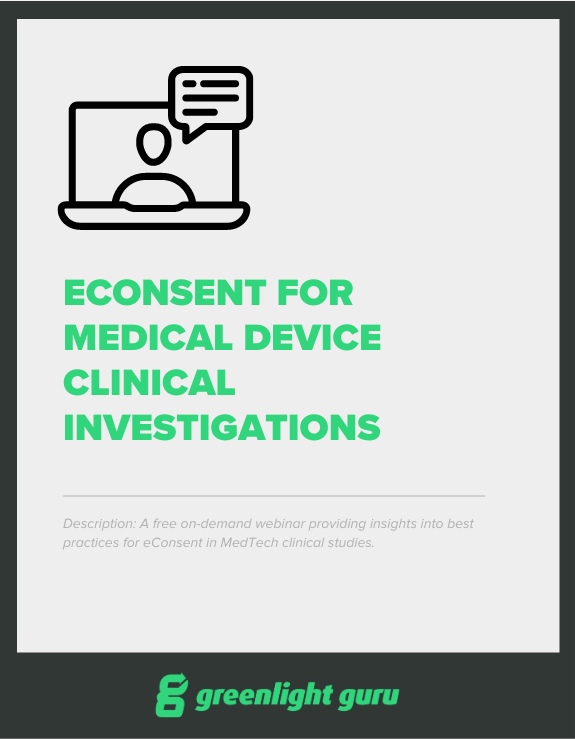Best Practices for eConsent in Medical Device Clinical Investigations

Just as remote treatment options are increasing due to advancing technology and the COVID-19 pandemic, remote clinical investigations are increasing as well. Decentralized clinical investigations, especially those that involve medical device clinical investigations, will typically require some type of eConsent from the participants in the study.
This blog includes several best practices you should follow regarding eConsent in medical device clinical investigations. You can also watch our webinar on eConsent on demand.
What is eConsent?
eConsent involves two distinct types of consent.
- Informed Consent: This type of consent is for ethical reasons.
- Data Processing Consent: This type is primarily for data production uses.
Note that it's not always necessary to obtain both types of consent. Sometimes, there is a soft enrollment in studies. Sometimes, investigators may split the studies into two parts, each requiring a different kind of consent.
The consent process still requires several steps. These include presenting the objects of the trial or study, making sure participants understand all rights, risks, and ethics regarding the trial, and then gaining the participants' acceptance. Basically, eConsent is a digital reproduction of this process. You can complete eConsent digitally or traditionally. A traditional method means a signature on a piece of paper.
The individuals involved in this process include:
- Clinicians
- Patients or subjects
- Guardians or relatives for those who need special permission or consent
Electronic signatures are electronic using an ink-like signature on a specific device. A biometric signature may rely on fingerprints, iris scans, or even different types of algorithms. Digital signatures and advanced biometric signatures are also options.
What are eConsent variations?
eConsent has different aspects to consider, basically breaking down into three specific types.
- Subject Only: The subject registers and accepts consent without active involvement. This often includes a survey-based type of data collection. This is only acceptable in certain countries and for specific situations and studies.
- Subject & Investigator Remotely: The subject and investigator sign remotely, sometimes after a conference call. This is likely to become what trials use the most in the future. It will enable trials and investigations to involve a diverse group of individuals and allow clinicians to conduct trials on a global level more easily.
- Subject & Investigator On-Site: Participant and investigator sign electronically, but they work together in person. User-friendliness is sometimes greater on site for understanding the process and working together, but it still makes sense to gain eConsent digitally.
What is eConsent compliance?
Regulatory compliance involves understanding the difference between eConsent and eSignature. Most countries that primarily conduct trials and clinical investigations will accept eConsent. Not all countries, however, accept both for all clinical investigations. Only a few countries have specific guidelines for these processes.
A few deciding factors can help you determine if you need consent in your trials or investigations. Questions to ask include the following:
- Why do we need eConsent? To what degree is it necessary?
- What variation suits my study design?
- What countries and places will support this process?
What are some case examples?
The following are a few examples regarding eConsent.
- Covid-19 Cohort Study: This study took place in Iceland regarding the psychological impact of the pandemic. Each participant was responsible for registering online through a website. Consent was a validated digital signature, and participants received questionnaires after signing.
- Fully Remote Device Trial: Recruitment starts through a conference call with physicians. The subjects and principal investigators all sign in remotely. Participants sign with a built-in ink-like signature. The participants then watch a video to learn about a device they will use at home during the study.
What are some FAQs?
The following are several FAQs regarding eConsent in a medical device clinical investigation.
- Is it necessary to use a validated vendor for eSignature? This depends on what country the study will occur in and if that country requires a vendor for eSignatures. There are several eSignature vendors in both Europe and the United States.
- How can participants withdraw their approval? This will depend on what type of eConsent you're using in the trial. Ideally, you want to make withdrawal as easy as possible. You'll want to make a portal available for a patient to easily sign in and withdraw from the study. Note that while an individual has rights to delete their data, some countries have laws that require those overseeing the investigations to store data from clinical trials for 10 years or more.
- Is video consultation always required? The short answer is no; a study does not always require a video consultation. For a high-risk study, however, most clinical investigators will recommend a video consultation. It helps to ensure that the participant completely understands all information regarding the trial.
- Can I combine eConsent with paper? Yes, this is possible. Using eConsent, you can put together a study or trial that will allow different types of consent throughout the process. It is possible to mix and match different consent options, using one type at one site and another at a different site.
Considering eConsent for your next medical device Investigation?
The age of paper is now past, and eConsent is how clinical investigations will continue to progress in the future. eConsent is already in use for enrolling participants in clinical research and medical device clinical investigation.
Reach out to us and let us help you determine the feasibility of applying eConsent to your study design - We're here to help.
Páll Jóhannesson, M.Sc. in Medical Market Access, was the founder and former CEO of Greenlight Guru Clinical (formerly SMART-TRIAL) and is currently the EVP of Europe at Greenlight Guru.










